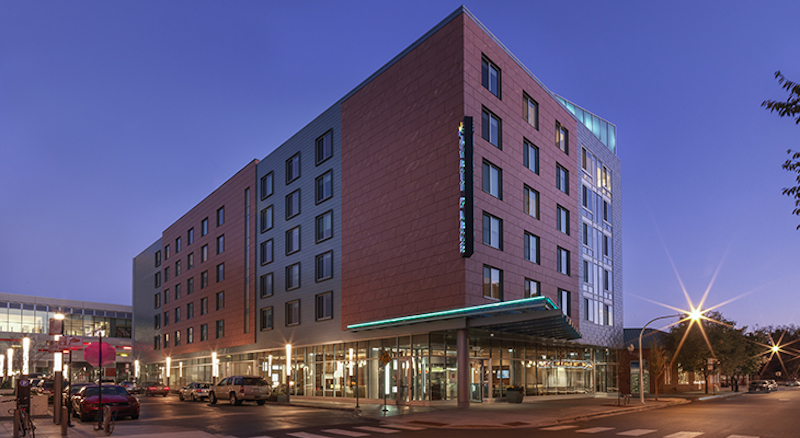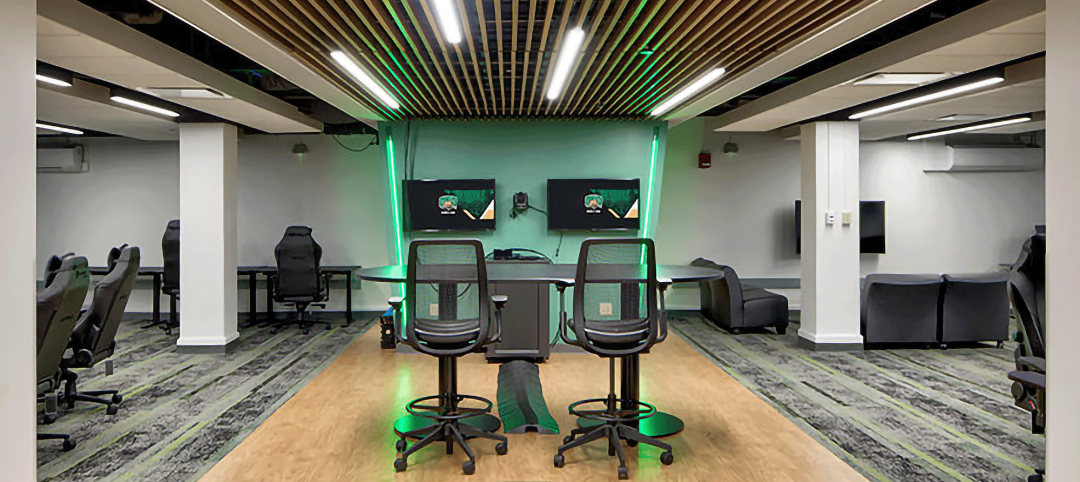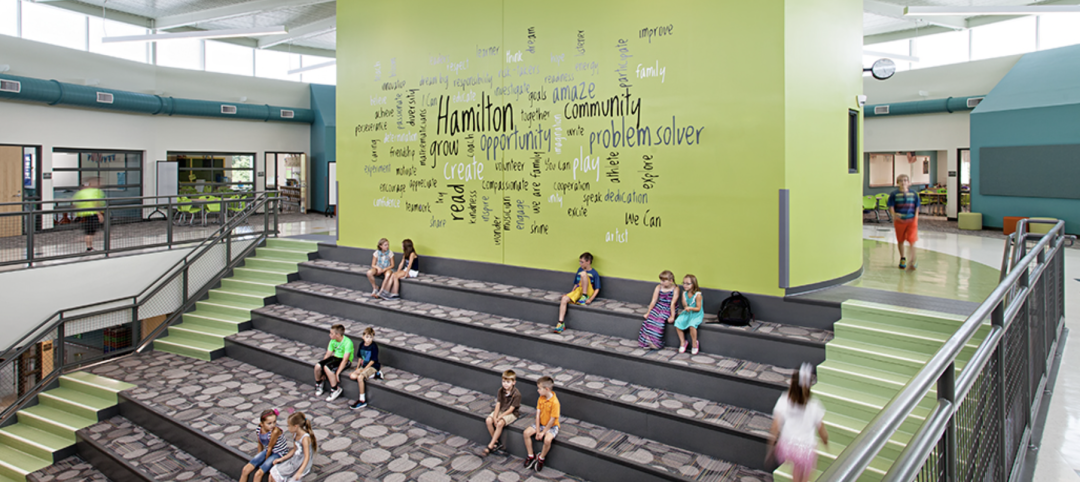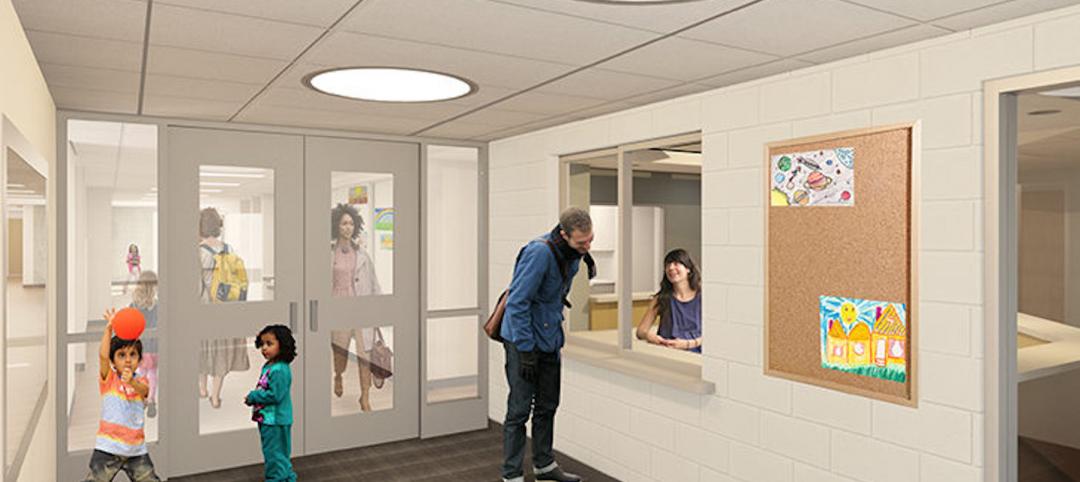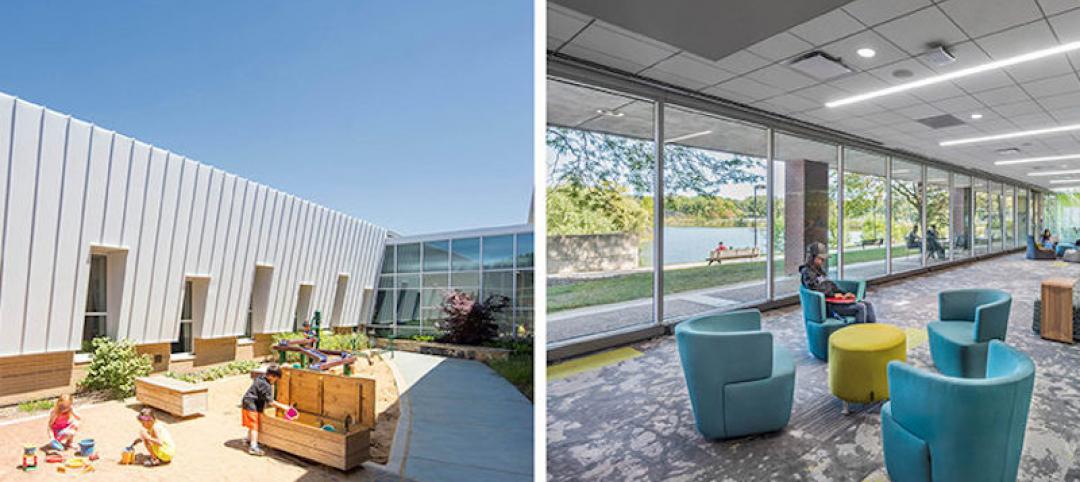Hotels generate an experience. The factors that contribute to that experience range from overall service and speed of check-in to dining and cleanliness. These things are critical, but it all starts with what creates the first impression: the facility.
Before guests step up to the reception desk, they take in the hotel’s façade, and then explore the lobby. If they are disappointed or even unimpressed, that sets the tone for their stay. If the design energy wows them, however, the hotel has taken a critical first step in securing guests who will not only return, but who will also tell others about their positive experience. First impressions count!
This series will offer tips on how hotel operators and designers can achieve facilities that wow guests at their first encounter, and help create positive memorable experiences throughout their stay.
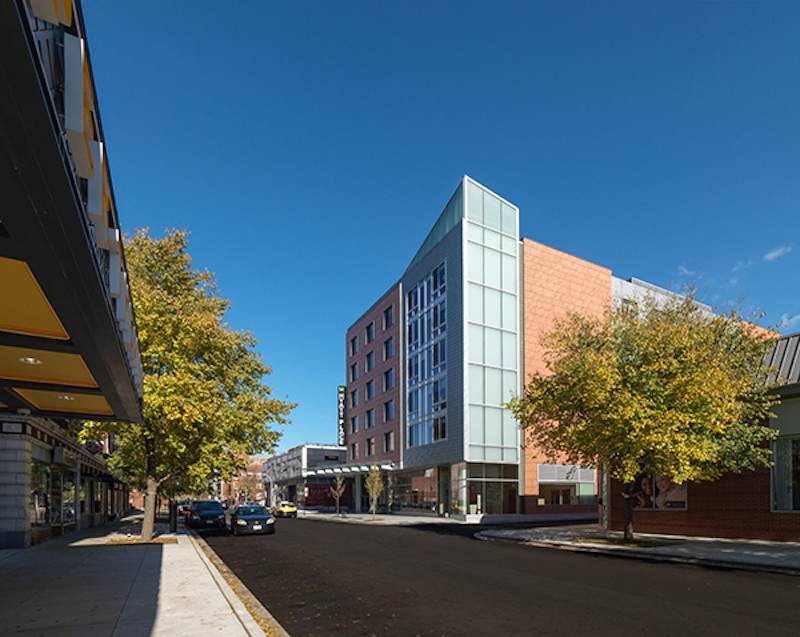 This view from the historic Harper Theater shows how Hyatt Place Chicago South/University Medical Center fits into the Harper Court development.
This view from the historic Harper Theater shows how Hyatt Place Chicago South/University Medical Center fits into the Harper Court development.
Appeal to Many Generations
One challenge that the hospitality sector constantly grapples with is how to draw different generations of people to one facility.
It was a challenge that developers The Olympia Companies and Smart Hotels faced when they set out to bring to Chicago’s prestigious Hyde Park neighborhood its first new hotel in over 50 years.
Among the many projected guests for Hyatt Place Chicago South/University Medical Centerwere Millennials, Gen Xers, Baby Boomers, fun-seekers, business travelers, families of students at the nearby University of Chicago Campus and Medical Center, tourists, and arts enthusiasts. Many different ages, many different interests.
The hotel design needed to capture the urban, multigenerational vibe of the site that it would occupy: the renewed Harper Court mixed-use development. Moreover, Hyde Park residents didn’t want it to clash with the cherished marble and masonry structures that populate the historic Chicago neighborhood. It was, after all, their first new hotel in half a century. Finally, the design needed to reinforce the Hyatt Place brand.
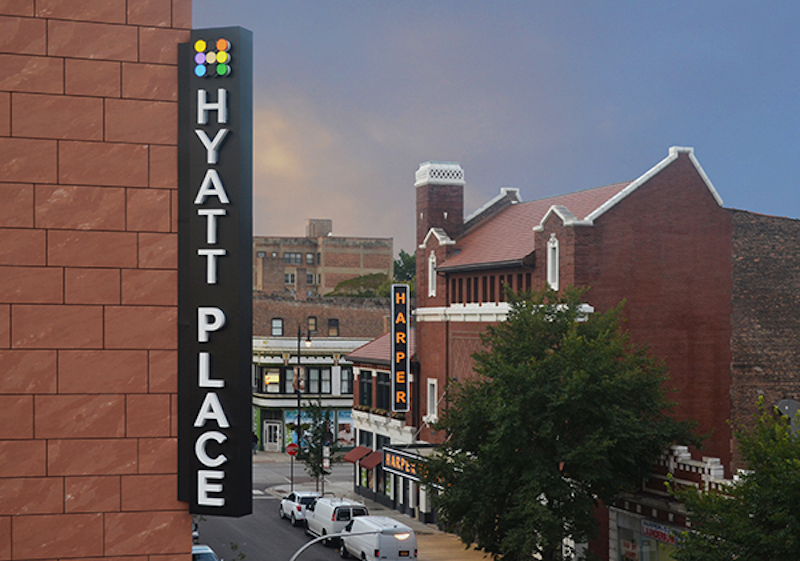 Materials and signage announce the Hyatt Place brand and complement the Hyde Park neighborhood.
Materials and signage announce the Hyatt Place brand and complement the Hyde Park neighborhood.
Be a Good Neighbor
A hotel’s design should complement the structures that surround it. It also needs to respect the concerns and issues of those who live nearby.
For Hyatt Place Chicago South/University Medical Center, the developers and Legat Architects met with Hyde Park residents. These community input sessions inspired the hotel façade design and gave locals a sense of ownership. The resulting design features porcelain tiles and zinc shingles that usher in a modern image, but their appearance—the colors and segmentation resemble masonry units—also respects the community’s historic context.
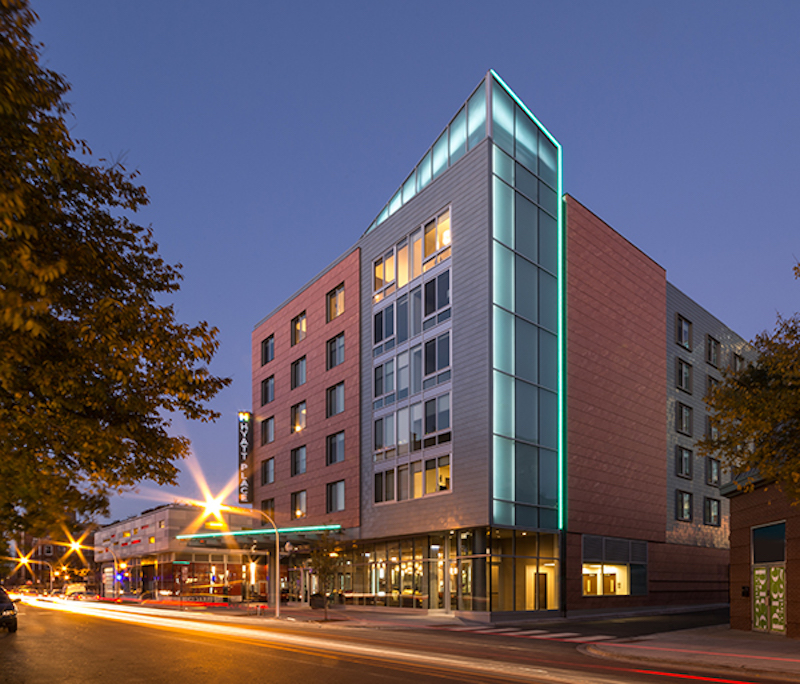 The zinc shingle and porcelain tile façade respects the community’s historic context, while creating a transition to the more modern design vocabulary of Harper Court.
The zinc shingle and porcelain tile façade respects the community’s historic context, while creating a transition to the more modern design vocabulary of Harper Court.
Tweak the Prototype
Another important factor in hotel design, especially when it comes to joining long-established neighborhoods with a distinct aesthetic, is a willingness to take some liberties with the prototype.
The overall appearance of Hyatt Place Chicago South/University Medical Center incorporates elements from the brand standard, but adapts the design to fit into the unique character of the neighborhood and capture a multigenerational audience. Examples include a glass canopy, a glass “edge” that illuminates the façade materials, customized artwork, and special lighting.
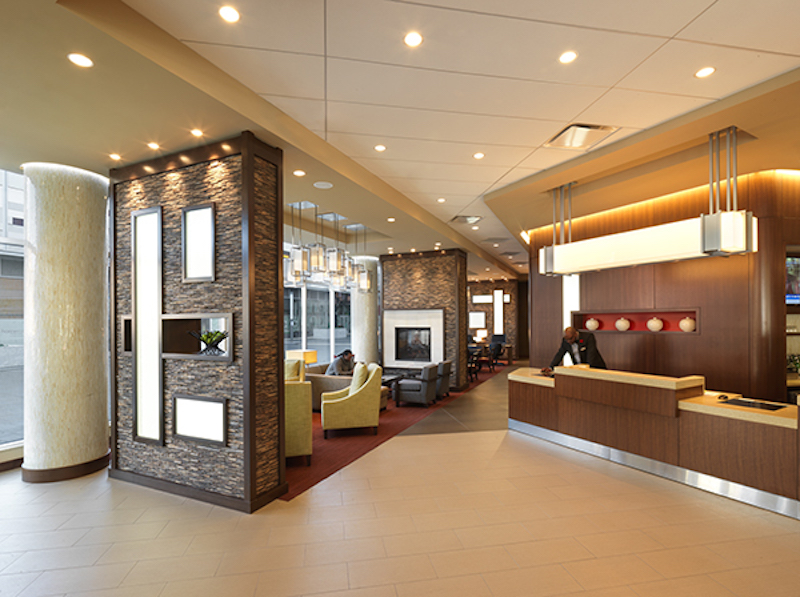 The design sets back the lobby and positions it on an angle to keep views open and pull people into Harper Court.
The design sets back the lobby and positions it on an angle to keep views open and pull people into Harper Court.
Design Makes a Difference
This summer, Hyatt Place Chicago South/University Medical Center will celebrate five years since its completion.
According to John Schultzel, The Olympia Companies’ vice president of hotel management, last year the hotel ran among the highest occupancies of any select service hotel in Chicagoland and came in at number one in its competitive set.
Schultzel concurs that the hotel’s design and multigenerational appeal have helped fuel its success.
“The hotel does a nice job of appealing to a broad cross section of travelers, from university dignitaries to visiting parents and neighborhood residents,” he said. “It provides a contemporary and stylish hotel product to a market that is underserved with high-quality hotel experiences.”
And does the community enjoy its first new hotel in fifty years?
During a post-construction visit, Mike Zimmerman, vice president of The Olympia Companies, struck up a conversation with someone at the hotel’s bar. Zimmerman said, “I asked her what brought her to the hotel. She said she was local, and had just stopped in to watch her favorite TV show. That’s what this project is all about . . . creating a destination that’s attractive to many visitors, but also where locals feel welcome.”
More from Author
Legat Architects | Feb 9, 2024
Disability and architecture: ADA and universal design at college campuses
To help people with disabilities feel part of the campus community, higher education institutions and architects must strive to create settings that not only adhere to but also exceed ADA guidelines.
Legat Architects | Jun 5, 2023
How to achieve cost-effective kindergarten classrooms
Educational architect Robin Randall shares realistic advice about the challenges of adding developmentally appropriate, play-based kindergarten classrooms while respecting budget limitations.
Legat Architects | Dec 19, 2022
Ohio University’s OHIO Esports Arena redefines video gaming
If a college student enjoys film studies, there is probably a place on campus where they can join other film buffs. But where can students who like video games go?
Legat Architects | Nov 30, 2022
10 ways to achieve therapeutic learning environments
Today’s school should be much more than a place to learn—it should be a nurturing setting that celebrates achievements and responds to the challenges of many different users.
Legat Architects | Jun 20, 2022
An architectural view of school safety and security
With threats ranging from severe weather to active shooters, school leaders, designers, and security consultants face many challenges in creating safe environments that allow children to thrive.
Legat Architects | Apr 6, 2021
Architecture and daylight: Planning strategies for energy-efficient buildings
Energy efficient, healthy, and affordable: the predictable nature of seasonal daylight geometry makes it one of the first topics to be considered when undergoing any design project.
Legat Architects | May 16, 2017
Architecture that helps children fall in love with the environment
The coming decades present a major ecological challenge... so let’s encourage the next generation to do something about it!
Legat Architects | Mar 30, 2017
Train station architectural design fundamentals: Accessibility
If safety is the number one priority for train stations, then accessibility comes in at a close second.

